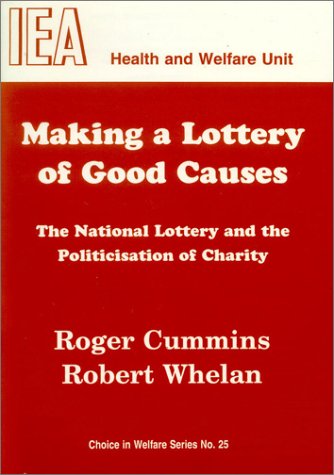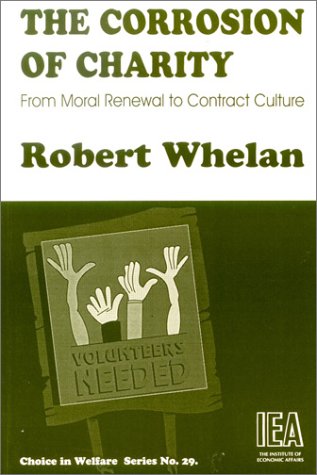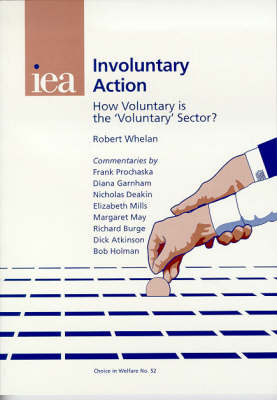Choice in Welfare S.
5 primary works
Book 11
Equal Opportunities
by David Conway, Michael Levin, Ellen Frankel Paul, Ivy Papps, Joan Kennedy Taylor, and Et Al
Published June 1992
Book 14
God and the Marketplace
by Michael Novak, Bishop John Jukes, Simon Robinson, Richard Roberts, Rev. John Kennedy, and Et Al
Published February 1993
Book 25
Book 29
For centuries the provision of welfare services to the needy was primarily the responsibility of private citizens and voluntary agencies, with the state acting as the provider of last resort, through the poor laws. The emergence in the twentieth century of a rights-based, universal welfare state has created a dilemma for the voluntary sector. Unable to compete with the state in terms of resources or coverage, many charities have become little more than government sub-contractors, charging fees to provide services. As a result, charities have lost some of their independence, their capacity to be innovative, and their special significance as primary institutions of civil society, providing training grounds for good citizenship. As the dividing line between civil and political society has become increasingly blurred, many voluntary organisations have been transformed from pioneering bodies into pressure groups for ever-greater state provision. Very few charities now offer any real alternative to the statutory approach or seek to base programmes on a more positive view of human nature. "Robert Whelan ...offers an unashamed free marketeer's critique." Community Care "A ...pamphlet by Robert Whelan intimates that the 'contract culture', the mechanism whereby charities receive money from government in return for undertaking set tasks, is contrary to the moral purpose of their Victorian founders.
" Financial Times.
" Financial Times.
Book 52
Voluntary action is an important component of a free society. It is part of what Friedrich Hayek called the third or independent sector, distinct from the state on the one hand and the market on the other. However, Robert Whelan argues that the voluntary sector today has allowed itself to be fatally compromised by its involvement with the state. Many charities derive a large part of their income from government. They have exchanged their independence for taxpayers' money since, in a state-funded 'voluntary' sector, the state determines the scope of voluntary action. It is what the government of the day is prepared to pay for. Politicians have come to regard voluntary bodies as part of the solution to the crisis of the welfare state, but the political dependency of many charities makes them part of the problem instead. How much can we expect from a voluntary sector which has allowed itself to be muzzled by contract and neutered by subsidy? "Robert Whelan, in an eloquent essay...describes how corrosive government has become, not least by imposing costly bureaucracy while stopping short of taking full responsibility, leaving the charity to carry the can if something goes wrong."
The Sunday Telegraph. "Many 'voluntary' organisations receive too much money from the Government and should lose their charitable status, according to a report published today." The Daily Telegraph. "...voluntary groups which accept grants or fees from the state should lose their charitable status...Involuntary Action...claims the sector should be part of civil society and 'the expression of conscience of a free people', instead of taking ever-larger income proportions from the government." Charity Times. "This is an important and very readable book which should be considered by all of those who are concerned about the state of charities as we enter into the 21st century." Community Care. "The sector also comes under fire for not funding its representative body, the National Council for Voluntary Organisations, which...derives 40 per cent of its income from the government. 'A voluntary sector which cannot fund its own representative body without taxpayers' money does not inspire confidence,' it says." Community Care.
The Sunday Telegraph. "Many 'voluntary' organisations receive too much money from the Government and should lose their charitable status, according to a report published today." The Daily Telegraph. "...voluntary groups which accept grants or fees from the state should lose their charitable status...Involuntary Action...claims the sector should be part of civil society and 'the expression of conscience of a free people', instead of taking ever-larger income proportions from the government." Charity Times. "This is an important and very readable book which should be considered by all of those who are concerned about the state of charities as we enter into the 21st century." Community Care. "The sector also comes under fire for not funding its representative body, the National Council for Voluntary Organisations, which...derives 40 per cent of its income from the government. 'A voluntary sector which cannot fund its own representative body without taxpayers' money does not inspire confidence,' it says." Community Care.



